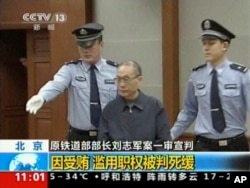Legal analysts and experts in China say that the fate of a 30-year-old Chinese man, sentenced to death for his murder of a village chief in a forced demolition dispute, is still up in the air.
This despite a growing public outcry to stay his execution.
Jia Jinglong from Hebei province of northern China was convicted of murder after he resorted to violence and shot his village chief to death with a modified nail gun in early 2015. This was two years after his house was allegedly demolished by force, after he was said to have exhausted all means to appeal his case.
The Supreme Court recently ratified Jia’s death sentence, which is expected to be carried out as early as Monday.
That was when Jia’s family rushed to petition both the Supreme Court in Beijing and the Intermediate Court in the province’s capital city of Shijiazhuang for a reprieve as well as a retrial. Many legal professionals have blamed the court for having turned a deaf ear to evidence in favor of Jia, which may qualify him for a lesser sentence.
So far, neither a reply nor an order to carry out the execution has been finalized, which Jia’s sister, Jia Jingyuan, took as a good sign.
There’s still hope
So far, she told VOA, the family has heard nothing regarding the petition.
“There’s still hope,” she added, explaining that her family will be allowed to meet Jia in person if he is to be executed.
According to her, Jia’s life was torn apart overnight after the wrecking team, led by the village head, flattened the house he had carefully renovated in preparation for his marriage. His fiance later left him — a tragedy that devastated the young man.
For now, Jia appears to have dodged a bullet, but that doesn’t mean he is out of the woods, says legal studies scholar Zhang Yaojie, one of the few legal observers who have been keeping an eye on the case.
“In the short term, it’s unlikely [that Jia will be executed]," Zhang said. "But shall his death verdict fail to be reversed, a surprise order can still arrive later to close his case when attention from both the media and the public dwindles. This is the biggest fear.”
Unjust ruling
Last week, many well-renowned law professors, including Liu Hong of East China University of Political Science and Law, He Haibo of Tsinghua University Law School, and Zhang Qianfan of Peking University Law School, presented legal opinions online in defense of Jia, who they said shouldn’t have been convicted as a capital murderer.
They argued that evidence shows Jia had attempted to turn himself in, although he was intercepted and beaten up by relatives of the victim minutes before reaching the police station. The village head, they added, should have been held accountable for his failure to secure a court order prior to the house demolition, a misstep that only intensified the dispute. For all of these reasons and more, the legal experts said, Jia’s death penalty should be ruled out.
Professor Zhang of Peking University urged the court to “exercise prudence in applying death penalties,” while his colleague He Weifang added that China should abolish the capital punishment for good.
Even state media, including China Daily and Global Times, raised concerns about the controversy.
Looming doubts
“We are not in the position to call a halt. Yet we feel strongly that the order must not be carried out,” China Daily in its editorial on Monday. “Not because social media are rife with cries against the ruling, but because the circumstances are anything but normal, and there are some outstanding questions that need to be properly answered."
Despite the public’s call to spare Jia’s life, legal scholar Zhang Yaojie says the country’s judicial system serves no one but those in power.
“I’ve studied how the police investigated [the case] and how the prosecutor indicted [Jia], all the way till the court handed down its verdict," he said. "The mindset of those [in power] has remained authoritative."
To the prosecutors and judiciary, Zhang said, Jia is "someone who had defied the government."
"[He is] proved to be a villain after [he has] killed someone," he added. "Even if evidence in favor of [Jia] has been spelled out, [the court] wouldn’t accept it and is determined to execute the death sentence.”
Zhang said he suspected the village chief had colluded with judicial system officials in his profit-oriented land grab initiative — an accusation the chief’s daughter flatly denied.
In an online forum, someone claiming to be the chief’s daughter argued that her father had successfully turned the village around after it suffered 600,000 yuan ($88,545) in debts before his 2009 rise to power. The author of the post also said that Jia’s father had given his consent to the demolition agreement in 2010, while the village had appropriated two new houses and 31,400 yuan ($4,700) in compensation to the family.
While her arguments have won some support online, as some Weibo users say Jia’s act was a premeditated and malicious murder, most netizens continue to threw their support behind Jia.
"In [the] face of oppression, he was forced to resist the authorities and shouldn’t be put on a death row," wrote one Weibo user. "Decades ago, his move would have been deemed heroic for getting rid of the evil.”
Some Weibo users contrast Jia’s plight to that of Gu Kailai, wife to former Politburo member Bo Xilai. Gu’s death sentence for poisoning a British businessman was suspended and later reduced to life in prison.





